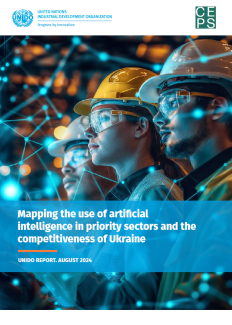Mapping the Use of Artificial Intelligence in Ukraine
Artificial intelligence has emerged as a cornerstone of modern technology, driving transformative changes across various sectors. From healthcare and education to transportation and manufacturing, AI's potential to optimize processes, enhance productivity, and foster innovation is unparalleled. As Europe strives to maintain its competitive edge on the global stage, embracing AI-driven solutions becomes essential.
In light of this context, and as part of the green industrial recovery programme for Ukraine 2024-2028 funded by the German Federal Ministry for Economic Cooperation and Development to support the response of the Government of Ukraine, UNIDO is pleased to announce the publication of a report conducted in collaboration with the Centre of European Policy Studies. Titled "Mapping the Use of Artificial Intelligence in Priority Sectors and the Competitiveness of Ukraine", the report highlights the critical role AI plays in Ukraine's development.
This report maps how and where AI technologies are being implemented in priority sectors in Ukraine, in order to identify leverage points for investment, research, market opportunities and to foster targeted development efforts. Although Ukraine is already on track to developing an AI-hub in Eastern Europe, further targeted efforts will not only enhance Ukraine’s economic resilience, societal benefit, and sustainable development, but also help increase Europe’s technological competitiveness on the global stage.
Equipping policymakers, industry leaders, and investors with the necessary information to undertake AI-driven initiatives, this report serves as a foundation for supporting industrial digital development, offering insights on the uses, enablers, and blockers of AI in the several priority sectors. Furthermore, the report outlines how recovery projects and immediate reconstruction ought to be integrated into a long-term innovation strategy with focus on AI to rebuild Ukraine’s infrastructure and position the country for future advancements.
Read the publication here.
For further information, contact Mr. Tomoyoshi Koume (t.koume [at] unido.org) or Mr. Nikolaus Martys (n.martys [at] unido.org).

